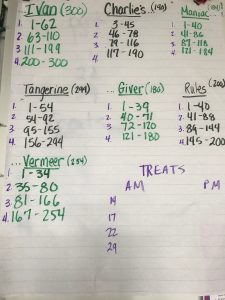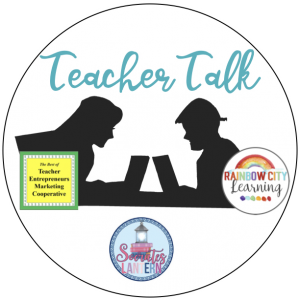
So I’m starting book clubs next week. Here are three things I’ve done to prepare for my first book club meeting which will simplify my job as teacher.
Prepare for Book Clubs by allowing time to read
This may seem like a no-brainer, but it can be a challenge. Here’s how I tackle it.
First, I prepare for book clubs by handing out the reading books at least four days in advance so that students have time to read to their page goal. You want your first meeting to feel successful for every student so they’ll want to keep participating. The most essential component to this success is completing the reading. Allot a class period or two so students can complete this all-important element. Of course many of the students will complete the reading at home, but the ones who may throw a wrench in your plans are most likely the ones who won’t read at home-especially if they’re uncomfortable with reading.
Another important job for the teacher is to break down the novel pages into as many chunks as meetings. For example, I think four meetings is an ideal number, so I have four reading chunks. However, I don’t break the reading chunks evenly because the number of days between reading chunks may differ. If you have two days between meetings, you want to assign fewer pages to read than if you have four days between meetings. Read more about supporting struggling readers through book clubs here at this blog post.

Prepare for Book Clubs by building your audio library
I try to have an audio version of the books I assign to struggling readers. I’ve even recorded my own voice reading certain chapters so I can help those students engage in the story. It’s been my experience that being able to listen to the beginning of a novel may be all a student needs to make the leap to independent reading. It takes time on my part, but it pays off. And once you have the audio version, it’s yours forever. (Reading a book into an iPad or other device may be something a parent can do to help out when they can’t be in the classroom.)
Provide work for early finishers
You’ll want to prepare for book clubs by providing work for those readers who complete everything early (and there will be those students). I always require that students have their own independent reading novel to read when they’ve completed the book club reading and activities.
It’s also a great time to utilize grammar review work. I especially like to use color-by-code activities, which keep students engaged and challenged and don’t require much work on your part. I always have differentiated versions of this work on hand so all students can engage without much guidance from the teacher, since you’ll be focused on helping students prepare for the upcoming book club meeting. Find a great variety of seasonal color-by-code grammar activities here.
Prepare for Book Clubs by displaying essential information
One of my best hacks for reducing teacher work during book clubs is to put up a list of page reading goals and dates for students to see at all times. See my photo.

Display page reading goals and meetings and reduce your workload.
This helps because I never have to answer the question “What page do I have to read to by next Wednesday?” and so forth. Also, I post the names of volunteers for snacks. So in one quick glance, we can all see important information.
Simplify checking in Book Club work
Another tip for keeping your workload to a minimum is to check in student work as they read. This helps because you can see who’s done and who needs more support. I give credit for completing the assigned pages. So on the day of our meeting I’ll know who I need to check, and I won’t have to check the entire class.
If I check in work the day of the meeting, my favorite way to do this so we can get right to our meeting is to have the class hold up their book club packets and show me the specific page I’m checking. My directions may go something like this, “Open to page 7 of your book club packet and show me your summary work.” They all hold up page 7 at the same time, and I scan the room. I have my grade book right there so it’s an easy mark to note who hasn’t completed the work and who may be absent. (Noting absences is important because you’ll need to know which job won’t be performed at the meeting. Also, if the leader is absent, you can assign another member of the group to follow the leader page. This way the book club meeting can still run smoothly.)
I’m not analyzing the packet work (yet). I may do this at a later date or I may not. The point of the packet is to get students to think about the reading and to participate in the book club meeting. Quite often, I may grade one of the four summaries. Or, my grade may be focused on listening and speaking. You can grade as much or as little as you like. Here’s my favorite book club packet that I use each year. It’s been recently updated, and I love it!
What to do if a student hasn’t completed the work
Preparing for book clubs means you’ll need to consider what you’ll do if a student hasn’t competed the work. I consider several points: Did the student have enough class time to really get a handle on things? Does this student have support at home? Did something come up to prevent completion? Is the student avoiding work? Does this student struggle with reading? Have I offered the supports needed to help the student succeed?
Since my goal is to get students to participate in discussing a novel, I try to do everything possible to make this happen. Generally, once a student sits in on the first meeting, the motivation increases for reading to the page goal and completing their share of the workload because they realize that they’ve let down the other members of the group.
There are times I’ll send a student who hasn’t done the work to another classroom for the first meeting. This impresses the point that the student needs to step it up the effort. They know they’ll miss out on the meeting and the treats that go along with it, and they also know that they’ll have to sit with me during their recess to present their share of the book club work that they failed to complete before the meeting.
Dealing with the challenging student and book clubs
There are years you’ll have a student or two who seemingly can’t or won’t do the reading. You have to use your judgement as to how you’ll proceed. If the student is completely distracting to the meeting process, you can do several things: ask the student’s parent to come in and sit with him or her during the meeting, put the student in a group where you have an extra adult (if you have a classroom aide), strategic partnering of this student with a group that won’t buy in to the distraction may work (having the audio version of the book is essential to this scenario), have one-on-one meetings with the student during their recess time so there is some discussion of the book, recognize that this student won’t read the book and yet allow them to sit in on the meeting so they get the experience (because they may never have it again), etc.
You know your students’ histories and motivations. You’ll have to make the decision based on what’s best for the student and the rest of the class. I like to get to know my students before I start my first round of book clubs. This is one reason I don’t hold a book club meeting until at least 6-8 weeks into the year.
So there you have some essential strategies to consider when using book clubs in your classroom. The more you prepare and anticipate, the smoother book clubs will run.
I’m teaming up with some fabulous bloggers this months. See the links below.





Marcy…Thanks so much for these great tips about Classroom Book Clubs. It’s never too early to prepare for you incoming students. Have a wonderful and restful summer vacation.
Thank you, Deann. I appreciate all that you do.
Wow! Great advice about forming book clubs. You’ve covered every “angle”. Thanks!
Thanks, Margo. I’ve run a lot of book clubs over the years.
You’re so organized. Great way to make sure kids are on task.
Thanks,Lisa. See you soon.